Vasella reveals the chemistry behind Novartis
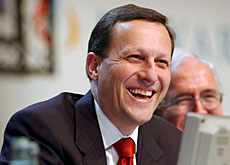
The head of Novartis, Daniel Vasella, says any merger with cross-town rivals Roche would be positive for both Switzerland and its pharmaceutical industry.
But Vasella told swissinfo in an exclusive interview that it is uncertain that a merger will ever happen.
Vasella explains that the 32.7 per cent Novartis stake in Roche is a long-term strategic investment. A merger, he feels, would have job creation potential for Basel and would strengthen competitiveness.
Vasella, who has led Novartis since its creation in 1996, also defends his dual role as chairman and chief executive of the company.
Novartis and Vasella are currently riding on the crest of the corporate wave in Switzerland.
Last month, Vasella was named Director of the Year for the third consecutive time in a poll of Swiss financial and business experts. The main reasons for his election were strategy, vision and sustainable corporate governance.
In the same survey, Novartis was voted the Swiss company with the best board of directors, ahead of Nestlé and UBS.
A new book, ‘Magic Cancer Bullet’ has put Vasella even more into the public eye. In it, he recounts how he spearheaded the development of Gleevec (Glivec outside the United States), regarded by many as the most exciting cancer breakthrough discovery yet.
swissinfo: Where are you leading Novartis? What is the strategy?
Daniel Vasella: “First of all, we are concentrating on health care and within health care on pharmaceuticals. That is really the core area. Innovation is the key success factor and that is where we put all our energy.”
swissinfo: It’s no secret that you want to merge with Roche. What advantages would you see? Why would a merger be the right chemistry?
D.V.: “Obviously the main interest for this country has to be to maintain a very strong pharmaceutical industry and the important aspect one has to keep in mind is how the industry has consolidated over the recent years. We have now some competitors who are significantly larger than we are. That of course puts us in a competitive situation where we have to fight hard. Size is not the only factor which determines success but is an important element.”
swissinfo: How long do you think you’ll have to wait because all the overtures so far have fallen on deaf ears in the Hoffmann and Oeri families – Roche’s majority shareholders?
D.V.: “I don’t know if they have fallen on deaf ears but certainly there has been no interest in even starting any discussions. What I would say is only that our [32.7 per cent] stake in Roche is an investment we believe in and we have no intention to change it. It’s a long-term investment as we said from day one and an investment with a strategic component. We haven’t changed our views.”
swissinfo: Would a merger not involve hundreds if not thousands of job losses?
D.V.: “No, in fact our merger [Ciba-Geigy and Sandoz joined to form Novartis in 1996] has demonstrated in the medium term that we eventually created jobs and didn’t destroy them. After an initial elimination of duplications, we rebuilt jobs and today have more jobs, also in Switzerland, than we ever had before and that is based on a healthy growth and on competitiveness. If ever such a merger would really happen, which is completely uncertain, I would be very positive as to the job creation potential for Basel, for Switzerland and our competitiveness.”
swissinfo: You’ve been feted as one of the most dynamic and charismatic business leaders of Switzerland. What makes you tick?
D.V.: “When somebody asks such a question you’re always sceptical about what it really means. I’m aware how fragile theses images are; how quickly they are built up and how quickly they are being destroyed. I think one has to be and remain very sober. But if you ask me what really gives me pleasure, then it is when we succeed in bringing an innovative compound, an innovative drug to the market, which changes people’s lives. That really has a deep meaning to us and is in fact the purpose of the company.”
swissinfo: How would you describe your business leadership style at Novartis?
D.V.: “We are certainly result-oriented. That is in no doubt in anybody’s mind, but being result-oriented one also has to set very clear boundaries. You need to have an organisational discipline, ethical standards across the organisation and for me the most important thing is to choose the right people and build a dynamic and professional team. That will make the company. It’s never a single person.”
swissinfo: You’ve been quoted as saying sentences like “Aggression is something beautiful” and “I want the competition to lose and can even have a malicious pleasure when something goes wrong for it.” Are you as ruthless as it sounds?
D.V.: “To me it sounds more like fun than ruthlessness. How would it sound if I would say ‘I’m very happy when we lose. I am extremely happy when competitors do better than we do’? It would be pretty ridiculous. I think the only thing which differs is that I have said it straight. Frankly, it’s no secret. What, however, I do believe is very important to add is ‘within the boundaries of fair competition and the law’. That is where we always have to reset the boundaries and direct the organisation so that everybody understands that.”
swissinfo: Mr Vasella, you’re one of the few who still has the dual function of chairman and chief executive at a Swiss company. To what extent do you think that there is a conflict of interest?
D.V.: “Frankly, I don’t believe there is a conflict of interest. Actually I think about 50 per cent [of Swiss business leaders] and 80 per cent in the US have the combined role. There is a movement to separate it and the reason is mostly due to the fact that people think there is a better check in balances when you separate the two jobs. I share the view that if you had no other control mechanism, it would be important to separate it. In our case we have an independent lead director who also chairs the executive sessions when I’m not present and who makes sure that I’m being assessed regarding my performance and we have a board structure where I’m the only dependent or insider. We, the board, feel very comfortable today with the setup we have.”
swissinfo: To what extent is the heat always on you because investors look at profitability and the analysts watch the drugs pipeline with a microscope these days?
D.V.: “It’s a fact that if you are in such a position you are always being watched and so you watch yourself too. That is perhaps the most important thing. What we’re trying to do is to build sustainable, economic value by delivering valuable products to our customers and therefore one cannot take a short-term view. If we would, we wouldn’t invest incrementally in research like we do now because that will not deliver before five to ten years. The important factor is that one is transparent about it and does not mislead investors.”
swissinfo: Do you think that you’ll stay at Novartis until you retire… or do you have career ambitions that might tempt you away?
D.V.: “No. I think it would be really difficult to lure me away. I think I’ll stay until retirement whenever that might be. I hope the end of my mandate will be normal and I won’t be fired like so many others. There are certainly other things I would like to do afterwards. Our family has created a private foundation and what I would like to do is eventually have some projects going on in the developing world, mainly for children, not just giving money but where I can get engaged personally. I would enjoy that.”
swissinfo: You own a high-powered BMW motorbike and you drive a Porsche. To what extent is Daniel Vasella something of a playboy in his spare time?
D.V.: “If the term playboy is determined by the motorbike and a Porsche then I would be one, but that’s not how I determine it. In fact, there is very little time for me to use them.”
swissinfo-interview: Robert Brookes
Daniel Vasella says that all Novartis energy is focused on innovation – the key success factor.
He feels that the Novartis stake of 32.7 per cent in Basel neighbour Roche is a strategic, long-term investment.
He believes it is uncertain that a merger will ever take place.
Vasella says he is proud that he and his colleagues have established a competitive, successful Swiss company operating in the world.
He argues that Novartis has to tap intellectual power wherever it is. Switzerland alone cannot supply the quantity of qualified people the company needs.
Novartis was created in 1996 by the mergers of the two Basel companies Ciba and Sandoz.
The name Novartis derives from the Latin “novae artes” – new skills.
Novartis made a profit of SFr7.3 billion ($4.7 billion) in 2002 on sales of SFr32.4 billion.
It is the sixth largest pharmaceutical company in the world, with a market share of 4.2 per cent.
Daniel Vasella was appointed chief executive of Novartis in 1996. He became chairman of the board in 1999.
He is also a member of the board of Pepsico and of the supervisory board of Siemens.
He has just written a book “Magic Cancer Bullet” which documents the challenges of bringing the revolutionary Gleevec drug to the market.
Gleevec won the swiftest passage ever for a cancer drug from the United States and Drug Administration.

In compliance with the JTI standards
More: SWI swissinfo.ch certified by the Journalism Trust Initiative

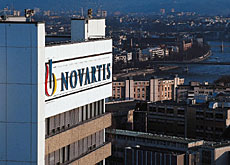
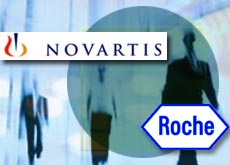
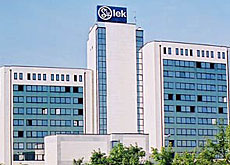
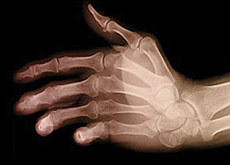
You can find an overview of ongoing debates with our journalists here. Please join us!
If you want to start a conversation about a topic raised in this article or want to report factual errors, email us at english@swissinfo.ch.